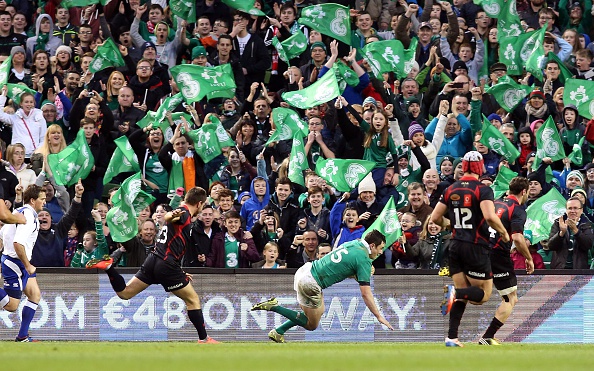Ireland recorded a convincing 49-7 win over Georgia in Dublin on Sunday, but what stood out from the game?
Pressure for places led to a patchy first forty
With thirteen changes made from the side that beat South Africa, there were a lot of players coming into this game feeling under pressure to perform. This weight of expectation wasn’t coming from the coaches or the fans but from the men themselves, who knew this was their opportunity to stake a claim for the jersey not only against Australia, but also, looking ahead to the Six Nations. As a result, it was a nervy first half. Despite dominating possession, they could not convert chances into points due to a lack of precision with ball in hand. At times Ireland lacked speed and a clinical edge in attack, but after the interval they played with greater tempo, patience and started to break down the Georgian defence.
Good things come to those who wait
Speaking of patience, Ireland learned (the hard way with last year’s final minute defeat against New Zealand) that it can pay to bide your time in this game. Similar to last week against South Africa, it was not until the second half that Ireland managed to open up the Georgian defence. The troubles in the first half at set piece and at times, the lack of shape in attack, highlight the importance of preparation time, especially with Joe Schmidt’s approach to using the squad as a whole.
Ireland must protect the ball better
During Schmidt’s reign, Ireland have tended to shy away from offloading and concentrated more on rapid ruck ball. In fact, against South Africa there were no offloads at all with the team deciding to concentrate on limiting risk. Perhaps the coaches saw this match against Georgia as a chance to experiment as Ireland managed seven offloads. However, in the first half in particular, they struggled to look after the ball in contact, giving up well worked positions by not carrying it into contact with greater care. Ireland won six turnovers to Georgia’s five, but against a stronger opposition like Australia next week, conceding that number of turnovers could prove lethal.
Confidence booster for those less experienced
For a few of the debutants it was a dream start to their international career. A commanding performance from Dave Foley in the second row earned the Munsterman the man of the match award. Stuart Olding came on in the second half when the Irishmen were in full flight but it eased the pressure and allowed the young centre to enjoy the occasion which he marked with a try. Felix Jones has been unlucky with injuries throughout his career, but he’s a star at his province and by showcasing his skills at the Aviva could have worked himself into the matchday squad for the Australia game. As for Ian Madigan, he’s not exactly unfamiliar but it’s not too often he’s had the chance to start in the Ireland 10 jersey. As always he played with confidence and injected a pace into the game that will ease the Irish fans nerves if Johnny Sexton ever does get injured.
It’s about ‘the group’ going forward
Every player that was interviewed after the game spoke about ‘the group’ and how being in the training squad was as important as a place on the pitch or the bench. This can often sound like one of those clichéd lines fed to players by the press team, but they genuinely sounded like they meant it. That’s not to say every one of them would not rather be in the first choice XV but Schmidt has instilled a mentality of togetherness, with an emphasis on the role of each individual within the squad. The players seem to understand that rotation is key if they are to take a strong squad to England 2015, and unlike other coaching regimes, no one is guaranteed a starting berth under Schmidt so there will always be movement. That means, everyone always has a chance and something to aim for.








